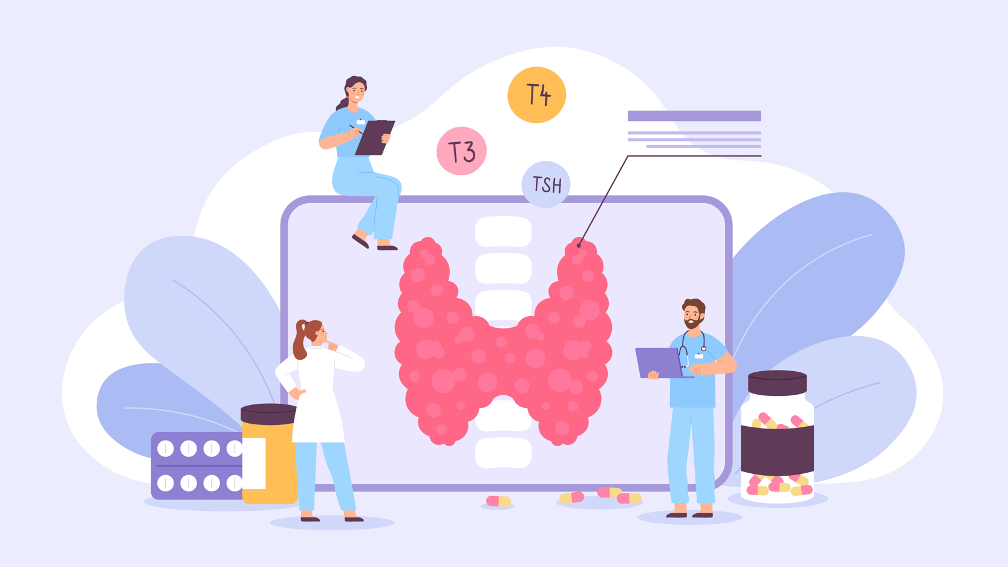Your thyroid is an important part of your body’s overall health. Properly functioning thyroid hormones help regulate metabolism, control body temperature and more. If your thyroid is not functioning properly, it may cause a variety of health problems, including hypothyroidism. Fortunately, there are ways to manage hypothyroidism and keep your thyroid functioning properly. Below, endocrinologists in Northwest Indiana provide some tips on how to keep your thyroid functioning properly and ensure your long-term health.
What is the thyroid?
The thyroid is a butterfly-shaped gland in the front of your neck and is an integral part of the endocrine system. It produces two primary hormones — thyroxine (T4) and triiodothyronine (T3). These hormones play a role in regulating metabolism, energy production, growth, development and body temperature.
What are the symptoms of a poorly functioning thyroid?
When the thyroid gland is not producing enough hormones, an endocrinologist in Northwest Indiana may diagnose you with hypothyroidism. Symptoms of a poorly functioning thyroid vary and include fatigue, weight gain, dry skin, thinning hair, constipation, depression, cold intolerance, hoarse voice and muscle weakness. Additionally, a person may have an increased sensitivity to medications or changes in their menstrual cycle.
What are the causes of hypothyroidism?
The most common cause of hypothyroidism is an autoimmune disorder called Hashimoto’s thyroiditis (also called: chronic lymphocytic thyroiditis). With this condition, the body’s immune system mistakenly attacks the thyroid gland, causing it to become underactive.
Other causes of hypothyroidism include iodine deficiency, medications such as lithium and amiodarone, radiation treatments for cancer and surgical removal of part or all of the thyroid gland. Some genetic conditions — such as Down syndrome — may also lead to hypothyroidism. In addition, women are more likely to experience hypothyroidism than men.
How can you manage hypothyroidism?
Hypothyroidism may be managed with the help of hormone replacement therapy. This involves taking daily doses of thyroid hormones such as levothyroxine to replace the hormones that your body is not producing.
In addition to hormone replacement therapy, an endocrinologist in Northwest Indiana may suggest making some lifestyle changes – such as reducing stress and avoiding environmental toxins like cigarettes and other pollutants – to help to manage hypothyroidism.
A healthy, balanced diet also is essential to managing hypothyroidism. Foods high in vitamin B and iodine, such as fish, shellfish and dairy products, may help support thyroid health. Eating foods rich in omega-3 fatty acids and selenium also helps boost thyroid function. Additionally, some herbs – such as ashwagandha – can help reduce hypothyroidism symptoms.
It is important to consult with an endocrinologist in Northwest Indiana if you think you may have hypothyroidism for proper diagnose and treatment of the condition. If left untreated, hypothyroidism may lead to more serious medical issues such as heart disease, depression, infertility and more. With proper management and treatment, however, it is possible to live a normal life with hypothyroidism.
Final Thoughts
The thyroid is an important organ that plays a vital role in maintaining overall health. If left unchecked, hypothyroidism may cause severe medical issues. It is important to be aware of the symptoms and causes so you recognize and manage the condition. If you think you may have hypothyroidism, consider seeing an endocrinologist. Proper treatment and self-care make it possible to manage your condition and live a healthy and balanced life.
Looking for an Affordable Endocrinologist in Northwest Indiana?
Are you ready to schedule a visit with an affordable endocrinologist in Northwest Indiana? If so, look no further than 219 Health Network. We have licensed endocrinologists on staff who specialize in treating hypothyroidism and other endocrine disorders, including diabetes, osteoporosis and low testosterone.
Contact us today at (833) 219-0001 to learn how we can help.


